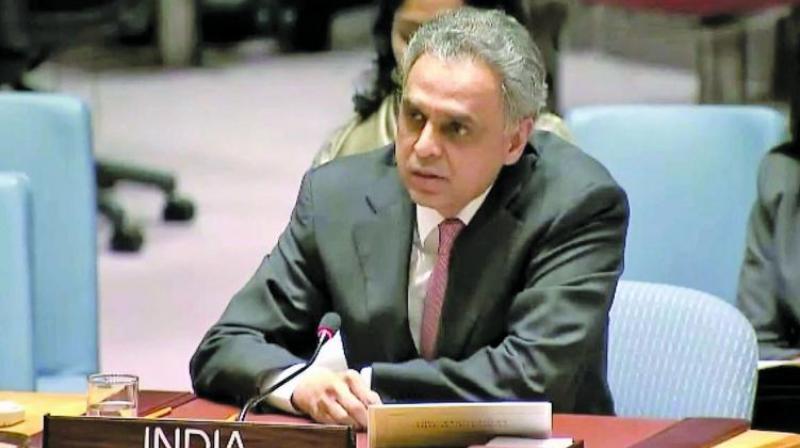Unrealistic to expect UN peacekeepers to protect civilians during conflict: India
Akbaruddin underscored that conflicts where peacekeeping operations were deployed were inherently messy, complex and difficult.

United Nations/ New Delhi: India has said it is “unrealistic” to expect from UN peacekeepers protection of civilians in the absence of clear mandates, and suggested developing a “politically attuned” framework for the purpose.
Speaking at a UN Security Council debate on ‘Protection of Civilians in Armed Conflicts’ on Tuesday, India’s Permanent Representative to the UN, Ambassador Syed Akbaruddin, said the Council’s membership needs to frame mandates with clarity and specificity.
“Every time this Council reviews a peace keeping operation, it is incumbent that it undertakes a serious examination of whether the peacekeepers have the ability to do what they are expected to carry out in extremely trying circumstances,” Akbaruddin said.
“It is clear that the expectations that the UN peacekeepers can effectively ensure protection of civilians in the absence of clear mandates are not realistic,” he said.
Akbaruddin said the need to protect civilians in the context of UN peacekeeping operations has gained prominence since the 1990s, as armed conflict situations have evolved rapidly in the changed global geo-strategic context.
“..from inter-state to more intra-state situations, often involving non-state actors and terrorist networks and led to large scale violence against civilians,” Akbaruddin said.
He, however, added that the growing instances of serious attacks on peacekeepers and the high level of casualties suffered by them in different missions point out to the difficulties of being able to implement so-called robust mandates in situations involving rival warring groups mixed with civilian populations.
“This also risks the credibility and the image of the United Nation’s neutral presence in armed conflict situations,” he added.
The Indian envoy said the responsibility lies with those deciding the resources to be made available to peacekeepers so that they are able to fulfil the tasks that they are mandated to do.
He pointed out that a number of courses of action and mechanisms and processes were available to address the operational issues and it is up to the Council to harness these in a collaborative effort.
“For this, it is also useful to consider evolving a normative architecture for protection of civilians as part of a broader endeavour. A framework that is politically attuned, but not politicised or seen as being instrumentalised. It is only then can we move forward with cohesion to address issues that have exacted a heavy price of civilian lives,” he said.
Akbaruddin underscored that conflicts where peacekeeping operations were deployed were inherently messy, complex and difficult.
“However, these should not be taken as an excuse to accept the devastating impact of conflict on civilians,” he said.
He stressed that the responsibility of protecting the civilians lies, first of all, with the national governments and rued that “very little” was being done for bolstering it.
“There is a tendency to assume that protection is about how civilians can be protected by others – i.e., somebody other than those affected – the parties to the conflict, peacekeepers, and humanitarian organisations,” he said.
In this regard, he said, strengthening national and societal mechanisms is primary as outside agencies can only supplement and not supplant them.
United Nations Secretary-General Antonio Guterres urged the international community to do more to protect civilians caught in conflict, given that more than 128 million people worldwide require immediate humanitarian aid, mostly due to war and violence.
He noted that last year, more than 26,000 civilians were killed or injured in six countries affected by conflict: Afghanistan, the Central African Republic, the Democratic Republic of the Congo, Iraq, Somalia, and Yemen.
“The most effective way to protect civilians is to prevent conflicts and to end them,” Guterres told the Council.
“This is why conflict prevention, resolution and peace building are, and will remain, the highest priorities for the whole United Nations system.”

